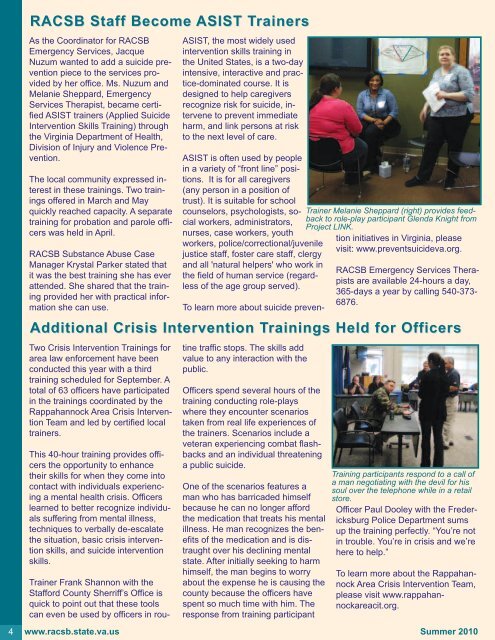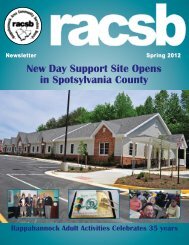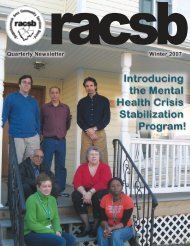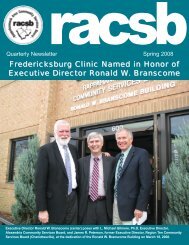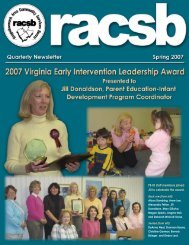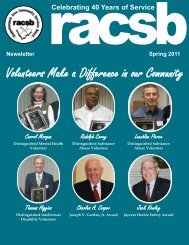40 Years of Service 1970 - 2010 - Rappahannock Area Community ...
40 Years of Service 1970 - 2010 - Rappahannock Area Community ...
40 Years of Service 1970 - 2010 - Rappahannock Area Community ...
You also want an ePaper? Increase the reach of your titles
YUMPU automatically turns print PDFs into web optimized ePapers that Google loves.
RACSB Staff Become ASIST Trainers<br />
As the Coordinator for RACSB<br />
Emergency <strong>Service</strong>s, Jacque<br />
Nuzum wanted to add a suicide prevention<br />
piece to the services provided<br />
by her <strong>of</strong>fice. Ms. Nuzum and<br />
Melanie Sheppard, Emergency<br />
<strong>Service</strong>s Therapist, became certified<br />
ASIST trainers (Applied Suicide<br />
Intervention Skills Training) through<br />
the Virginia Department <strong>of</strong> Health,<br />
Division <strong>of</strong> Injury and Violence Prevention.<br />
The local community expressed interest<br />
in these trainings. Two trainings<br />
<strong>of</strong>fered in March and May<br />
quickly reached capacity. A separate<br />
training for probation and parole <strong>of</strong>ficers<br />
was held in April.<br />
RACSB Substance Abuse Case<br />
Manager Krystal Parker stated that<br />
it was the best training she has ever<br />
attended. She shared that the training<br />
provided her with practical information<br />
she can use.<br />
Two Crisis Intervention Trainings for<br />
area law enforcement have been<br />
conducted this year with a third<br />
training scheduled for September. A<br />
total <strong>of</strong> 63 <strong>of</strong>ficers have participated<br />
in the trainings coordinated by the<br />
<strong>Rappahannock</strong> <strong>Area</strong> Crisis Intervention<br />
Team and led by certified local<br />
trainers.<br />
This <strong>40</strong>-hour training provides <strong>of</strong>ficers<br />
the opportunity to enhance<br />
their skills for when they come into<br />
contact with individuals experiencing<br />
a mental health crisis. Officers<br />
learned to better recognize individuals<br />
suffering from mental illness,<br />
techniques to verbally de-escalate<br />
the situation, basic crisis intervention<br />
skills, and suicide intervention<br />
skills.<br />
ASIST, the most widely used<br />
intervention skills training in<br />
the United States, is a two-day<br />
intensive, interactive and practice-dominated<br />
course. It is<br />
designed to help caregivers<br />
recognize risk for suicide, intervene<br />
to prevent immediate<br />
harm, and link persons at risk<br />
to the next level <strong>of</strong> care.<br />
ASIST is <strong>of</strong>ten used by people<br />
in a variety <strong>of</strong> “front line” positions.<br />
It is for all caregivers<br />
(any person in a position <strong>of</strong><br />
trust). It is suitable for school<br />
counselors, psychologists, social<br />
workers, administrators,<br />
nurses, case workers, youth<br />
workers, police/correctional/juvenile<br />
justice staff, foster care staff, clergy<br />
and all 'natural helpers' who work in<br />
the field <strong>of</strong> human service (regardless<br />
<strong>of</strong> the age group served).<br />
Trainer Frank Shannon with the<br />
Stafford County Sherriff’s Office is<br />
quick to point out that these tools<br />
can even be used by <strong>of</strong>ficers in routine<br />
traffic stops. The skills add<br />
value to any interaction with the<br />
public.<br />
Officers spend several hours <strong>of</strong> the<br />
training conducting role-plays<br />
where they encounter scenarios<br />
taken from real life experiences <strong>of</strong><br />
the trainers. Scenarios include a<br />
veteran experiencing combat flashbacks<br />
and an individual threatening<br />
a public suicide.<br />
One <strong>of</strong> the scenarios features a<br />
man who has barricaded himself<br />
because he can no longer afford<br />
the medication that treats his mental<br />
illness. He man recognizes the benefits<br />
<strong>of</strong> the medication and is distraught<br />
over his declining mental<br />
state. After initially seeking to harm<br />
himself, the man begins to worry<br />
about the expense he is causing the<br />
county because the <strong>of</strong>ficers have<br />
spent so much time with him. The<br />
response from training participant<br />
Trainer Melanie Sheppard (right) provides feedback<br />
to role-play participant Glenda Knight from<br />
Project LINK.<br />
To learn more about suicide prevention<br />
initiatives in Virginia, please<br />
visit: www.preventsuicideva.org.<br />
RACSB Emergency <strong>Service</strong>s Therapists<br />
are available 24-hours a day,<br />
365-days a year by calling 5<strong>40</strong>-373-<br />
6876.<br />
Additional Crisis Intervention Trainings Held for Officers<br />
Training participants respond to a call <strong>of</strong><br />
a man negotiating with the devil for his<br />
soul over the telephone while in a retail<br />
store.<br />
Officer Paul Dooley with the Fredericksburg<br />
Police Department sums<br />
up the training perfectly. “You’re not<br />
in trouble. You’re in crisis and we’re<br />
here to help.”<br />
To learn more about the <strong>Rappahannock</strong><br />
<strong>Area</strong> Crisis Intervention Team,<br />
please visit www.rappahannockareacit.org.<br />
4<br />
www.racsb.state.va.us Summer <strong>2010</strong>


